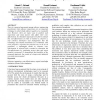Free Online Productivity Tools
i2Speak
i2Symbol
i2OCR
iTex2Img
iWeb2Print
iWeb2Shot
i2Type
iPdf2Split
iPdf2Merge
i2Bopomofo
i2Arabic
i2Style
i2Image
i2PDF
iLatex2Rtf
Sci2ools
ISSRE
2000
IEEE
2000
IEEE
Assessing the Cost-Effectiveness of Inspections by Combining Project Data and Expert Opinion
There is a general agreement among software engineering practitioners that software inspections are an important technique to achieve high software quality at a reasonable cost. However, there are many ways to perform such inspections and many factors that affect their costeffectiveness. It is therefore important to be able to estimate this cost-effectiveness in order to monitor it, improve it, and convince developers and management that the technology and related investments are worthwhile. This work proposes a rigorous but practical way to do so. In particular, a meaningful model to measure costeffectiveness is selected and a method to determine the cost-effectiveness by combining project data and expert opinion is proposed. To demonstrate the feasibility of the proposed approach, the results of a large-scale industrial case study are presented. Keywords Software inspection, cost-effectiveness, expert knowledge elicitation, Monte-Carlo simulation
Cost-effectiveness | ISSRE 2000 | Software Engineering | Software Engineering Practitioners | Software Inspection |
| Added | 31 Jul 2010 |
| Updated | 31 Jul 2010 |
| Type | Conference |
| Year | 2000 |
| Where | ISSRE |
| Authors | Lionel C. Briand, Bernd G. Freimut, Ferdinand Vollei |
Comments (0)

